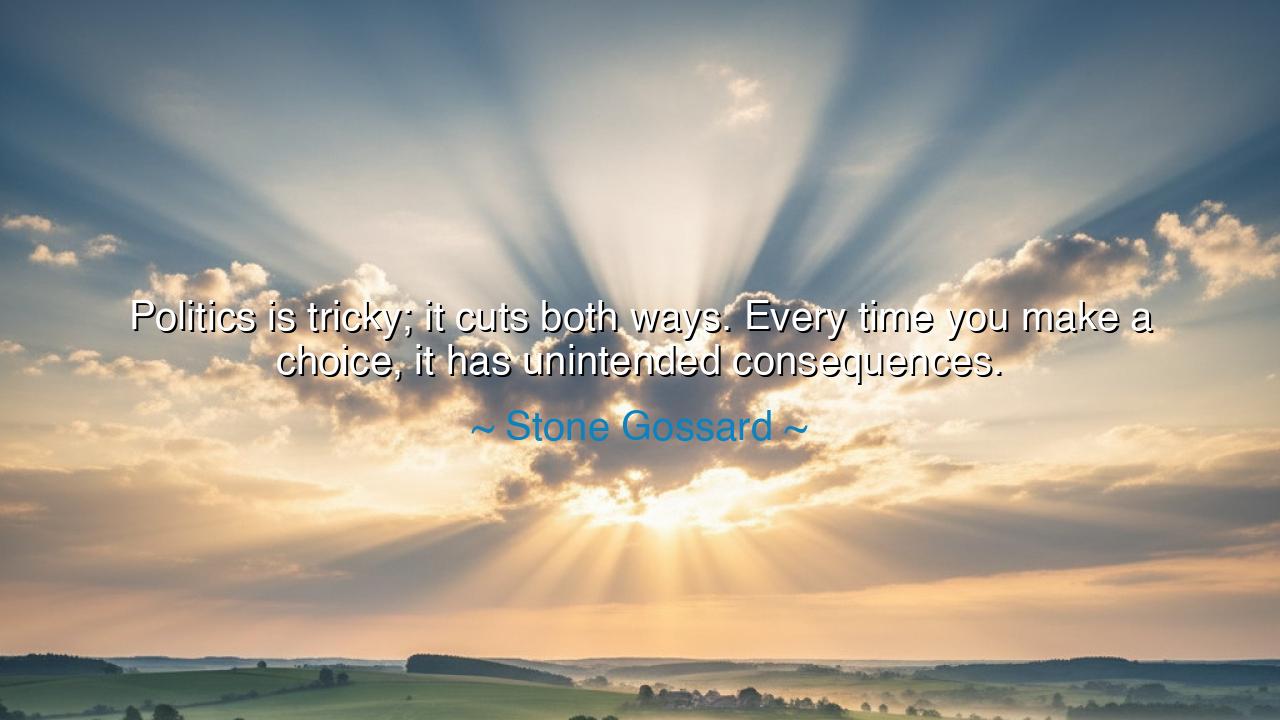
Politics is tricky; it cuts both ways. Every time you make a
Politics is tricky; it cuts both ways. Every time you make a choice, it has unintended consequences.






When Stone Gossard declared, “Politics is tricky; it cuts both ways. Every time you make a choice, it has unintended consequences,” he gave voice to one of the oldest truths of power. Politics is not a straight road, but a labyrinth where each step opens doors unseen, and each decision casts shadows no one intends. To rule, to legislate, or even to speak in the realm of politics is to wield a double-edged blade—one that can defend, but also wound the hand that grasps it.
The ancients themselves warned of this peril. In the councils of Athens, Pericles sought glory for his city, but his choices led to war that consumed the very democracy he cherished. In Rome, Caesar sought stability, but his ascent shattered the Republic and birthed empire. Thus Gossard’s words echo across centuries: no choice in politics is pure, and even noble intentions may bear bitter fruit.
This truth is not confined to the distant past. In modern history, leaders who sought to liberate nations often unleashed divisions they could not foresee. When the Berlin Wall fell, the promise of freedom swept across Eastern Europe. Yet alongside triumph came economic hardship and unrest, consequences unimagined by those who first struck the hammer against the stone. In this way, unintended consequences reveal themselves not as accidents, but as the hidden companions of every decision.
Gossard’s insight also reminds us of humility. The politician, the ruler, the citizen—none can claim full mastery of the future. To act in politics is to act in uncertainty, to accept that one’s choices may ripple outward in ways impossible to control. Wisdom, then, lies not in the illusion of perfection, but in vigilance: to weigh decisions carefully, to adapt swiftly, and to learn from the consequences that inevitably arise.
Thus, let this lesson endure: beware the double edge of politics. Act with courage, but also with caution, knowing that the destiny of nations rests not only on intention but on consequence. For the wise leader is not the one who believes their choices are flawless, but the one who acknowledges the trickiness of politics, and who dares to navigate its currents with patience, humility, and unyielding responsibility.






7NVien 7/4 Nguyen
Gossard’s insight into the complexity of politics is really thought-provoking. The notion that every choice has unintended consequences highlights the ethical burden of decision-making in politics. Should leaders focus on minimizing harm at all costs, or is it more important to act decisively, even if some negative outcomes are inevitable? It’s a tough balance—how do we learn from past decisions to make better ones in the future while still pushing forward meaningful change?
HLDuong Hien Luong
Politics is definitely tricky, and Gossard nails it with the idea that every decision has unintended consequences. It’s a bit daunting to think about how even well-intended actions can lead to unforeseen problems. How do we, as citizens, hold leaders accountable when their choices lead to negative outcomes that weren’t anticipated? Is it possible to reduce these consequences, or is political life inherently full of risks? It makes me think about how often we overlook the bigger picture in political decisions.
QCNguyen Quynh Chi
Stone Gossard’s take on politics speaks to the inherent challenge in decision-making. It’s easy to think of politics as black and white, but in reality, every choice involves a level of uncertainty and complexity. If politicians constantly face unintended consequences, does that mean they should aim for smaller, more cautious decisions? Or does the risk of consequences mean they should aim for bold changes, hoping to outweigh any negative effects?
PHLe Thị Phuong Hà
This quote really gets to the heart of why politics feels so complicated. The idea that every choice made has unintended consequences shows how difficult it is to make lasting, positive change. How often do politicians act on short-term goals without thinking about the long-term effects? In a way, it’s a double-edged sword—they might solve one problem but create another in the process. Can there ever be a way to predict or control these consequences?
NLVo Nguyen Loc
Gossard’s statement about politics is a reminder of how unpredictable it can be. Every decision has a far-reaching impact, and often, we don't see the full consequences until much later. It makes me think about how many decisions we, as individuals, make every day without fully understanding the ramifications. In a world of constant change, how can we make more informed choices to minimize unintended consequences, whether in politics or in our personal lives?